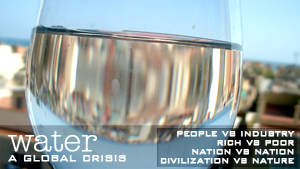
|
26 August 2007 :: Lainey Johr New efforts are being encouraged to recategorize climate change, shifting public focus away from science and shedding light on its vital importance by comparing global warming to a global security threat. According to British climate change ambassador John Ashton, there is a need to approach global warming from a war stance. We are in a war, and our soldiers —people, plants, animals, the very Earth itself— are down for the count. Mr. Ashton spoke to a seminar of 40 scientists representing 13 nations, meeting in Norway 750 miles from the North Pole. Said Ashton, "The Cold War was the last big problem the world faced on so many fronts — economic, political, industrial". His colleagues at the convention suggested that the approach to global warming as a security threat would make it easier for people to understand its vital and immediate importance enough to mobilize high numbers of people to save the planet. The scientific consensus at the meeting suggested that too much emphasis is being placed on the economic burdens of reversing or halting climate change on individual fronts such as industrial pollution. Instead, Mr. Ashton and his colleagues want to see a shift in perspective and focus by environmental advocates and governments alike in order to address the risks we are taking as a global community and the consequences of our actions, or of inaction. Also of integral importance is changing people's daily activities. Even though it is understood that everyone has to make changes in their daily lives in an effort to fight global warming, there is little consensus on how to convince people to do so. A great frustration for scientists comes from knowing that people are difficult to motivate into taking simple measures, like turning the thermostat down a few degrees. Experts say that necessary changes can be made without causing a noticeable difference in comfort or lifestyle, yet would save a lot of energy and waste. The question lingers of how to encourage and ensure that people and industries alike make the right adjustments such as switching to renewable energy sources or cutting toxic emissions. They liken people's unwillingness to think of future consequences when dealing with global warming to a smoker or compulsive over-eater. People often do not consider the long-term effects when making daily decisions. They simply do not understand that even a slight increase in initial cost for something like an energy saving bulb will reap long term benefits that greatly outweigh those initial costs, according to Nebojsa Nakicenovic from the Vienna University of Technology. It has been estimated that the global economy would only lose about three percent of the global gross domestic product by 2030 if strict measures were taken now, suggesting that economic anxiety as a reason not to take action is for the most part unwarranted. The price to pay in the fight against global warming appears to be rather reasonable, especially considering the devastating and severe consequences if we do nothing and just let the seas rise. [s]
RELATED STORIES: Fires across Greece have taken at least 51 lives over three days, and the government has declared a state of emergency in all parts of the country. Media, ministries, and scientists are attempting to understand how so many forest- and brush-fires could appear in so many places so quickly. The southern Peloponnese peninsula has been called the "epicenter" of the catastrophe, with fires now threatening major ancient monuments and the capital, Athens. [Full Story] WATER RESOURCE STRESS: GLOBAL ECONOMIC-ECOLOGICAL FACTOR FOR THE 21ST CENTURY Water is one of the "fundamental building-blocks of life", as is often said in science, in biology classrooms, in medicine, theology, environmental policy debates, and in cosmology and space exploration. It is also a commodity whose economic reality is increasingly defined by chronic scarcity and often intensely uneven distribution. [Full Story] GEOTHERMAL ENERGY CREATES HOPE FOR GLOBAL ENERGY SOLUTION The race to tap large quantities of underground, geothermal energy is heating up. In a recent bid to solve their country's demand for clean energy, the Swiss are digging deep, and the Earth is responding. A scientist at MIT, in the US, says 40% of US geothermal sources could power the entire country's energy needs in excess of 56,000 times. [Full Story] |
||||||||||||||||||||
|
|||||||||||||||||||||









